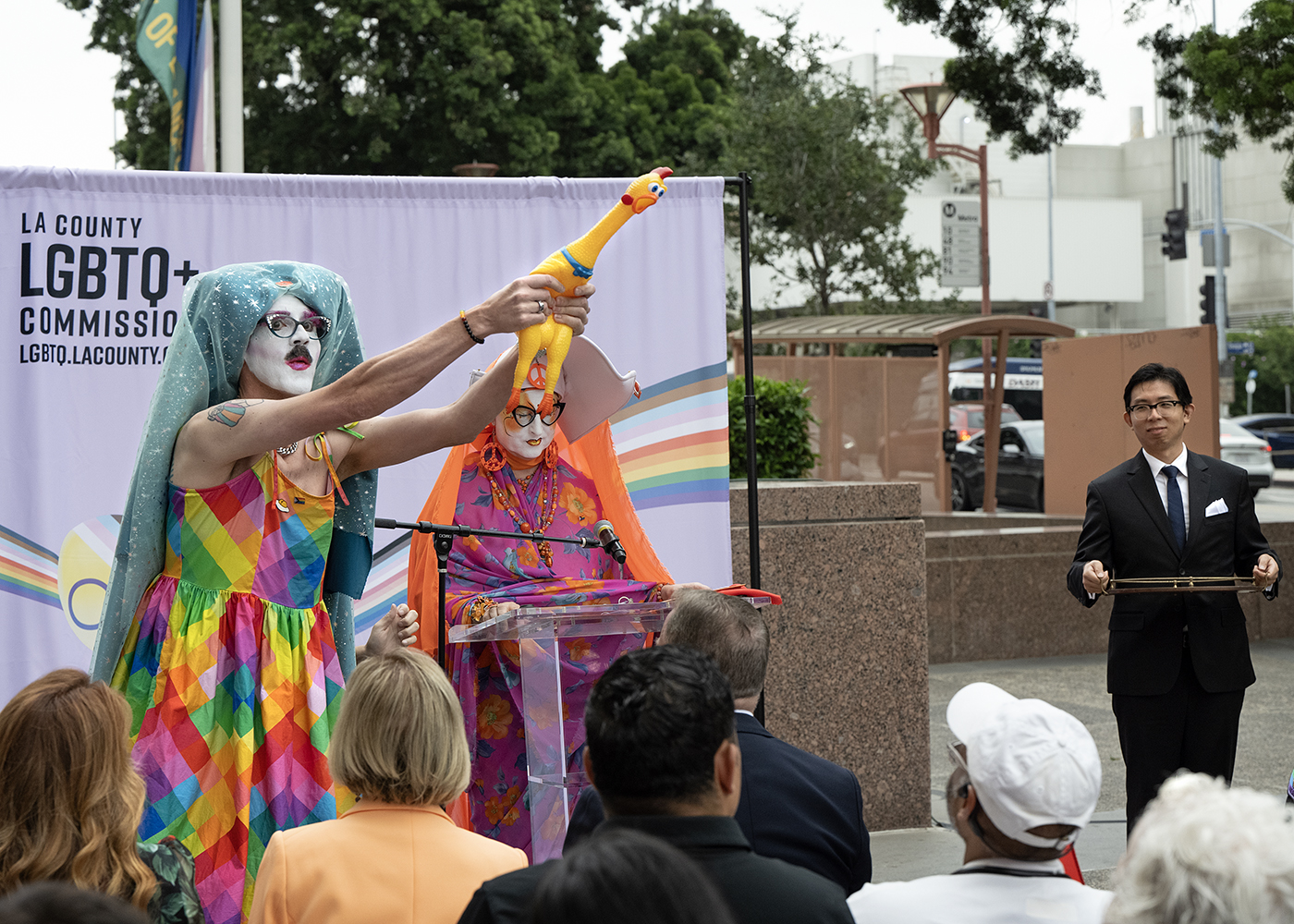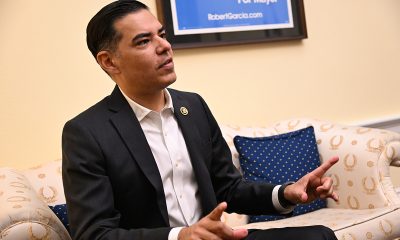Politics
American Library Association’s Emily Drabinski on book bans
“They have a tiny number of people who are very, very loud and draw a lot of attention and in some cases can drown out the other side”

ARLINGTON, VA. – American Library Association President Emily Drabinski was in Washington for the PFLAG National “Learning with Love” Convention, whose timing and theme are particularly apposite this year given the escalating fight this week on Capitol Hill over book bans.
She connected with the Washington Blade Saturday morning to discuss matters including how best to combat efforts to pull books from library shelves and ways to help restore public faith in the these institutions along with the qualified professionals serving in them.
Drabinski on Wednesday was named to the Out 100 2023 list, which celebrates the year’s “most impactful and influential LGBTQ+ people” and has included some of the most famous and celebrated public figures.
The honor comes about 16 months after Drabinski was named ALA president and then immediately earned right-wing backlash for a celebratory tweet in which she reflected on the significance of her election as a lesbian with progressive views.
Among the first to speak out against her over the tweet was a co-founder of Moms for Liberty, the anti-LGBTQ group that promotes book bans, opposes public support and funding for libraries and other institutions, and is considered a far-right extremist group by the Southern Poverty Law Center. It was not long before elected Republican officials followed suit.
These critics often argue for their right to hold and express political opinions as they wish while claiming that others are unsuited for high profile roles because they hold or have shared views they find objectionable, those that are left-of-center, said Drabinski, who acknowledged homophobia also played a role in the outrage directed at her.
At the same time, Drabinski stressed that her focus remains on the responsibilities of leading the ALA, many of whose 49,000+ members have also been personally targeted by school boards, elected officials, and advocacy groups like Moms for Liberty.
The ALA is not alone in raising the alarm over the alignment of these parties and interests in favor of censoring certain ideas and voices, a movement which according to PEN America has led to an unprecedented number and range of titles being pulled from library shelves across the country.
“These efforts are a threat to student’s rights and freedoms,” according to a spokesperson for the U.S. Department of Education, whose Office of Civil Rights last month appointed Deputy Assistant Secretary Matt Nosanchuk whose duties include responding to book bans, taking “enforcement action when necessary.”
This interview has been edited for length and clarity.
American Library Association President Emily Drabinski
October 21, 2023 Interview with the Washington Blade’s White House correspondent, Christopher Kane.
Washington Blade: Reading about the backlash you encountered, I was reminded of Gigi Sohn’s confirmation process in the Senate and how ugly that got. I’m curious to hear how your experience with this may have impacted the way that you look at whether and how to share your political views publicly. And more broadly, as the issues that are top of mind and front and center for ALA are becoming really politically fraught, how you look at the intersection of politics with your work?
Emily Drabinski: It’s a question I think about constantly. You know, I think everybody has a political viewpoint, all of us do, and my political views inform how I think about the world and how I explain the world to myself, but the American Library Association isn’t about me. The status of American libraries is not about me. Attacks on the right to read and and libraries in general, they might have my name on them, but they’re clearly not about me.
What’s been frustrating is to see the whole entire Association — which is about what libraries are about, which is building community; it’s about collective action and collectives of people coming together. [So], to see the focus on me as an individual has been really distressing.
It’s also not lost on me which ideas you can have, which identities you can have, or which you can write — like what political viewpoint will get you this kind of blowback. And it’s not everybody, right? It’s only some of us. You know, they’re all about freedom of thought and they’re all against cancellation of individuals for their viewpoints, and yet they don’t extend that to people from across the political spectrum.
Blade: You mentioned the issue of which identities are allowed. The homophobia seems not to be lingering beneath the surface; this is really tinged with homophobia.
Drabinski: Absolutely. When the Montana Library Commission voted to not renew their membership with the American Library Association, that was about my queer identity as much as it was about anything else.
Regardless of what they said, when you listen back to the hearing, there were that someone on the call quoting Leviticus — which felt like, you know, so, so regressive, and a kind of conversation about queer identity that I had, that I remember us having in the 90s. And I thought we were in a different kind of world, but it’s like the book bans — there are obvious attacks on black people, people of color, indigenous people, and LGBTQ+ people. And so it’s no surprise that they’ve come from for me also, I suppose.
Blade: Did you meet with lawmakers when you were in Washington, and can you tell me about what your advocacy work has looked like recently?
Drabinski: I did not meet with lawmakers. I was here to be at PFLAG. ALA continues to work with lawmakers, and I think it’s important to say across the political spectrum, you know, we there’s broad bipartisan support for libraries. That’s always been true. And so we work with people from all sides of the aisle around the right to read. So, you know, I don’t want it to seem like the politicization of libraries is coming from the Republican Party in general. I think we all know it’s from a minority of people that don’t represent the broad political spectrum in this country.
Blade: And those voices have become, I think, amplified on social media. You’ve certainly had experiences with Moms for Liberty. I’m curious to hear your thoughts about the group and its influence and maybe some of the ways that that that might be countered, you know, from the left.
Drabinski: I don’t follow the group very closely, you know, just because I think that their work — they want to sort of sow chaos, I think, inside of public institutions, including schools and libraries. They’re very well funded; their funding is difficult to track. They clearly aren’t local, right? You have in many libraries Moms for Liberty groups trying to ban books when they’re not even members of the community.
But I think what we can learn from them is what it means to be loud, right? They have a tiny number of people who are very, very loud and draw a lot of attention and in some cases can drown out the other side at various school and library board meetings. But what I’m seeing on the ground when I travel around the country is that once people understand what is happening in their libraries, they are quick to mobilize against it.
Even in southern Louisiana, right, near the gulf where you had St. Tammany Parish, the story of the attacks on the libraries there which have been definitely driven by these organized groups. [The state’s Attorney General] Jeff Landry [created] a tip line where you can report on your librarians and teachers for distributing, you know, inappropriate materials or whatever. He campaigns on this issue in St. Tammany, but even in St. Tammany, the community is organized to fight back and you see books now making their way back to the shelf.
So, I think that there’s something for us to learn — that we need to be as loud as they are. We know we’ve got numbers on our side. As long as we can get everybody out to the meeting when the decisions are being made, as long as we can get people who are pro-library, pro-reading and pro-freedom, frankly, in positions of authority in local government and on library boards, I think we’re gonna win because poll after poll shows that that nobody’s against children reading. You just can’t be.
Blade: I’m reminded now of your comments during last night’s panel discussion at the PFLAG conference about the importance of these library board elections. Do you think that there’s more work to be done to build out an infrastructure of grassroots organizing around these issues in the same way that Moms for Liberty has done?
Drabinski: Yeah, I think so. I think that’s the way to win, right, is to have densely organized people on the ground who have a vision of a world that’s about equality and equal access to public resources. We have the desire to have people live on our side. Most people want those things. But the one thing I would push back against is the idea that we don’t have organized entities doing that kind of work already. I think we’ve paid less attention to those movements than we should.
So, for example, in St Tammany Queer North Shore is a social group that has been organized around all the things that LGBTQ+ people do, hanging out with each other, going to potlucks, go to parties, or making a float for the Mardi Gras parade — but then they also see what’s happening in their local library and they organize quickly and got a lot of the community out to support the library.
There’s a recent story in Convergence Magazine that talks about a library in Danvers, Massachusetts where they had people organized to protest a drag queen makeup hour, where they were gonna teach you how to put on makeup, which is such a great program, right? And 350 people showed up from the organized labor community, the faith community, the other related movements like the environmental movement, in that area. They showed up en masse to protect the library and formed a human chain, a human wall around a library to keep the 11 protesters away.
So I think sometimes the stories we tell overemphasize the power that groups like Moms for Liberty have, when we have lots of examples that I think get a little less airtime, where you see organized people who care about libraries showing up and and winning.
Blade: There’s also this persistent problem of declining faith in expertise and institutional knowledge. How do you think the media could do a better job of relaying information about these topics?
Drabinski: Every time I see a profile of — you know that profile in the Post of like the 11 people who are behind the vast majority of book ban attempts? I want every one of those profiles to be matched by a profile of a school or public or academic librarian who is doing critical, community based, community focused work to make life better for people.
We’re very activated around the book banners, but we don’t pay enough attention to the parts and places where we’re winning. And so I think a better understanding of what librarians do every day, and what library workers contribute to their community…I see all of this attention being paid to us around the books and stuff. And I want to use this moment to tell the stories of American libraries that are bigger and better and greater than that.
When I go around to libraries and talk to library workers, and they show what they’re doing — everything from a library in Ames, Iowa, [where] you can borrow a pair of reading glasses in the library in case you forgot yours. Like, a little example of the library solving a problem for people and every every library will have like in that same library. And in that library in Ames, there were like 15 other things that were evidence that librarians were solving problems for the community. So I think it’s really important to tell those kinds of stories and they’re a little less sexy, I think, than the meanness, but I think they’re also really important.
That expertise piece, you know, I heard this like stat many years ago about Flickr, the old photo site, the most popular tag on on Flickr was “me,” the word “me,” because people wanted to be able to click on the word and find pictures of themselves. People, right? We curate worlds for ourselves, which is [not shameful]; we all do it.
But what library workers do is they think about everybody at once. They think about the public and think about meeting the needs of the public. So even the “parent’s rights” thing, like I’m a parent. I have rights. I have a child that I want to protect and the idea that by giving my child access to a diverse range of reading materials, which is absolutely a priority in my household, that that would somehow be an attack on someone else’s children. It’s like my librarians know and understand and appreciate publics in a way that nobody else does.
If we could talk more about that public and the service that libraries provide, it would be good for all of us to be thinking about other people rather than so much about our individual solitary worldviews.
I find that when I tell stories about what’s happening in public libraries to people, they’re blown away. Like, there’s a library where you can check out a cotton candy machine in Donnelly Idaho — rural Donnelly, Idaho, a town of like, I don’t know, 4000 people, the vast majority of whom are living below the poverty line.
The library is a public entity that makes it possible for everybody to have a birthday party. And, once a month, they get queer kids together for like after=hours hangout time and they’ve got three or four kids who show up and it’s the only place in the community where they can use the names that they have for themselves and the pronouns that they use for themselves without fear of reprisal. And that’s the work of the library, making that possible.
I think if we could tell more of those stories, of what libraries really do — which is absolutely not distribute pornography — that is not what any library is doing, I absolutely promise you that. It’s not happening.
Blade: For me, the question of who ought to decide things like which materials should be made available to young people and of which ages is settled just with the knowledge that librarians are required to have master’s degrees. But there are many people who refuse to defer to the expertise of medical doctors. Is the kind of storytelling you were describing a way to get around this problem?
Drabinski: Yeah, but you erode trust in public institutions, and you defund them over 40 years of organized disinvestment in the public sector, and then you find that they are weakened. And then you say, this institution is weak and failing, and then you attack it. And we’ve seen this again and again, libraries aren’t the first and we won’t be the last. I think we have a lot to learn from public education, because they came for the teachers at schools first, and now they’ve come for us.
Blade: Absolutely, and in the arts more broadly. I’m thinking of Jesse Helms’s crusade against the National Endowment for the Arts in the 80s.
Drabinski: Totally. we’ve been here before, you know, but I think for a lot of us — I was talking to a couple of other PFLAG-ers this morning, and we can’t believe we’re here again.
Blade: The word “unprecedented” is cropping up a lot lately…
Drabinski: Who doesn’t love a library? Everybody loves the library, right? This attack on a much beloved public institution and the people who steward that institution, that feels unprecedented to me. I had no idea that the world would turn against us in this way; it’s been challenging.
Congress
White House finds Calif. violated Title IX by allowing trans athletes in school sports
Education Department threatens ‘imminent enforcement action’

The Trump-Vance administration announced on Wednesday that California’s Interscholastic Federation and Department of Education violated federal Title IX rules for allowing transgender girls to compete in school sports.
In a press release, the U.S. Department of Education’s Office of Civil Rights threatened “imminent enforcement action” including “referral to the U.S. Department of Justice” and the withholding of federal education funding for the state if the parties do not “agree to change these unlawful practices within 10 days.”
The agency specified that to come into compliance; California must enforce a ban excluding transgender student athletes and reclaim any titles, records, and awards they had won.
Federal investigations of the California Interscholastic Federation and the state’s Department of Education were begun in February and April, respectively. The Justice Department sued Maine in April for allowing trans athletes to compete and refusing a similar proposal to certify compliance within 10 days.
Broadly, the Trump-Vance administration’s position is that girls who are made to compete against trans opponents or alongside trans teammates are unfairly disadvantaged, robbed of opportunities like athletics scholarships, and faced with increased risk of injury — constituting actionable claims of unlawful sex discrimination under Title IX.
This marks a major departure from how the previous administration enforced the law. For example, the Department of Education issued new Title IX guidelines in April 2024 that instructed schools and educational institutions covered by the statute to not enforce categorical bans against trans athletes, instead allowing for limited restrictions on eligibility if necessary to ensure fairness or safety at the high school or college level.
Sports aside, under former President Joe Biden the department’s Office of Civil Rights sought to protect against anti-LGBTQ+ discrimination in education, bringing investigations and enforcement actions in cases where school officials might, for example, require trans students to use restrooms and facilities consistent with their birth sex or fail to respond to peer harassment over their gender identity.
Much of the legal reasoning behind the Biden-Harris administration’s positions extended from the 2020 U.S. Supreme Court case Bostock v. Clayton County, which found that sex-based discrimination includes that which is based on sexual orientation or gender identity under Title VII rules covering employment practices.
A number of high profile Democrats, including California Gov. Gavin Newsom, have recently questioned or challenged the party’s position on transgender athletes, as noted in a statement by Education Secretary Linda McMahon included in Wednesday’s announcement.
“Although Gov. Gavin Newsom admitted months ago it was ‘deeply unfair’ to allow men to compete in women’s sports, both the California Department of Education and the California Interscholastic Federation continued as recently as a few weeks ago to allow men to steal female athletes’ well-deserved accolades and to subject them to the indignity of unfair and unsafe competitions.”
Congress
Garcia elected top Democrat on the House Oversight Committee
Gay Calif. lawmaker vows to hold Trump-Vance administration accountable

U.S. Rep. Robert Garcia (D-Calif.) on Tuesday was elected top Democrat on the House Oversight Committee in a vote that signaled the conference’s overwhelming support for a newer voice on Capitol Hill who will play a key role taking on President Donald Trump.
With a margin of 150-63, the 47-year-old openly gay congressman defeated U.S. Rep. Stephen Lynch (D-Mass.), alongside U.S. Reps. Jasmine Crockett (D-Texas) and Kweisi Mfume (D-Md.) who exited the race after the House Democratic Steering and Policy Committee backed Garcia.
Serving only since 2023, the congressman has had a remarkably quick ascent leading up to his election this week as ranking member of one of the most powerful House committees, awarded a leadership position serving under House Democratic Whip Katherine Clark (Mass.) and selected as a co-chair of former Vice President Kamala Harris’s 2024 presidential campaign.
Democratic members began jockeying for the top seat on the oversight committee this spring after the late-U.S. Rep. Gerry Connolly of Virginia stepped away amid news that his esophageal cancer had returned. He died in May.
Connolly last year fended off a challenge from one of the most well known House Democrats, U.S. Rep. Alexandria Ocasio-Cortez (N.Y.), though with a narrower margin that signaled intra-party tensions over whether leadership roles should still be awarded based on seniority.
Garcia positioned himself as a bridge between the two camps — a consensus candidate with executive managerial experience as the former mayor of Long Beach. At the same time, particularly since the start of Trump’s second term, the congressman has emerged as one of the most outspoken critics of the new Republican regime.
In a statement on X Tuesday, Garcia thanked his colleagues and promised to “hold Donald Trump and his administration accountable.”
I'm honored to have been elected by @HouseDemocrats to serve as Ranking Member on @OversightDems.
— Congressman Robert Garcia (@RepRobertGarcia) June 24, 2025
We will hold Donald Trump and his Administration accountable for their corruption – and work to make our government more effective for the American people.
Let's get to work.
If Democrats win control of the House next year, the oversight committee will be able to exercise powers that are now available only to Republicans under the chair, U.S. Rep. James Comer (R-Ky.), which include the authority to investigate virtually any matter across the federal government, to issue subpoenas, and to compel testimony.
In the meantime, Garcia on Monday promised that Democrats on the committee would “vigorously fight” Republican Speaker Mike Johnson’s (La.) plans “to dismantle the Government Accountability Office.”
Congress
Padilla forcibly removed from federal building for questioning DHS secretary
Prominent Democrats rushed to defend senator

Democratic U.S. Sen. Alex Padilla of California was forcibly removed from a federal building in Los Angeles after attempting to ask questions of U.S. Homeland Security Secretary Kristi Noem during a press conference on immigration Thursday
The city has been rattled in recent days as protestors objecting to the Trump-Vance administration’s immigration crackdowns clashed with law enforcement and then the president deployed National Guard troops and U.S. Marines, which was seen as a dramatic escalation.
According to a video shared by his office, the senator, who serves as ranking member of the Senate Judiciary Immigration Subcommittee, introduced himself and said, I have questions for the secretary.” After he was pushed out of the room, officers with FBI-identifying vests told Padilla to put his hands behind his back and handcuffed him.
“Senator Padilla is currently in Los Angeles exercising his duty to perform Congressional oversight of the federal government’s operations in Los Angeles and across California,” reads a statement from his office.
“He was in the federal building to receive a briefing with General Guillot and was listening to Secretary Noem’s press conference,” the statement continued. “He tried to ask the secretary a question, and was forcibly removed by federal agents, forced to the ground and handcuffed. He is not currently detained, and we are working to get additional information.”
Democrats were furious, with many releasing strong statements online condemning the actions of law enforcement officers, including California Gov. Gavin Newsom (D), Los Angeles Mayor Karen Bass (D), and the state’s other U.S. senator, Adam Schiff (D).
Human Rights Campaign Chief of Staff Jay Brown also issued a statement: “A sitting U.S. senator should be allowed to ask a Cabinet secretary a question at a press conference — in his own state, on an issue affecting his constituents — without being violently thrown to the floor and handcuffed. Everyone who cares about our country must condemn this undemocratic act. Full stop.”
Congress
51 lawmakers sign letter to Rubio about Andry Hernández Romero
U.S. Rep. Robert Garcia (D-Calif.) spoke about gay Venezuelan asylum seeker

Forty nine members of Congress and two U.S. senators, all Democrats, signed a letter Monday to Secretary of State Marco Rubio demanding information about Andry Hernández Romero, a gay Venezuelan national who was deported to El Salvador and imprisoned in the country’s notorious Terrorism Confinement Center, a maximum-security prison known by the Spanish acronym CECOT
“We are deeply concerned about the health and wellbeing of Mr. Hernández Romero, who left Venezuela after experiencing discriminatory treatment because of his sexual orientation and opposition to Venezuela’s authoritarian government,” the lawmakers wrote. They urged the State Department to facilitate his access to legal counsel and take steps to return him.
After passing a credible fear interview and while awaiting a court hearing in March, agents with U.S. Immigration and Customs Enforcement reportedly transported Hernández out of the U.S. without due process or providing evidence that he had committed any crime.
In the months since, pressure has been mounting. This past WorldPride weekend in Washington was kicked off with a rally in front of the U.S. Supreme Court and a fundraiser, both supporting Hernández and attended by high profile figures including members of Congress, like U.S. Rep. Mark Takano (D-Calif.)
U.S. Rep. Robert Garcia (D-Calif.) was among the four members who wrote to Rubio about Hernández in April. On Friday, he spoke with the Los Angeles Blade before he and his colleagues, many more of them this time, sent the second letter to Rubio.
“There’s a lot of obviously horrible things that are happening with the asylum process and visas and international students and just the whole of our value system as it relates to immigration,” he said, which “obviously, is under attack.”
“Andry’s case, I think, is very unique and different,” the congressman continued. “There is, right now, public support that is building. I think he has captured people’s attention. And it’s growing — this is a movement that is not slowing down. He’s going to be a focal point for Pride this year. I mean, I think people around the world are interested in the story.”
Garcia said he hopes the momentum will translate to progress on requests for proof of life, adding that he was optimistic after meeting with Hernández’s legal team earlier on Friday.
“I mean, the president, Kristi Noem, Marco Rubio — any of these folks could could ask to see if just he’s alive,” the congressman said, referring to the secretary of Homeland Security, whom he grilled during a hearing last month. ICE is housed under the DHS.
“People need to remember, the most important part of this that people need to remember, this isn’t just an immigration issue,” Garcia noted. “This is a due process issue. This is an asylum case. We gave him this appointment. The United States government told him to come to his appointment, and then we sent him to another country, not his own, and locked him up with no due process. That’s the issue.”
Garcia said that so far neither he nor his colleagues nor Hernández’s legal team were able to get “any answers from the administration, which is why we’re continuing to advocate, which is why we’re continuing to reach out to Secretary Rubio.”
“A lot more Democrats are now engaged on this issue,” he said. U.S. Sens. Adam Schiff and Alex Padilla, both from California, joined Monday’s letter. “The more that we can get folks to understand how critical this is, the better. The momentum matters here. And I think Pride does provide an opportunity to share his story.”
Asked what the next steps might be, Garcia said “we’re letting his legal team really take the lead on strategy,” noting that Hernández’s attorneys have “already engaged with the ACLU” and adding, “It’s very possible that the Supreme Court could take this on.”
In the meantime, the congressman said “part of our job is to make sure that that people don’t forget Andry and that there is awareness about him, and I think there’s a responsibility, particularly during WorldPride, and during Pride, all throughout the month — like, this is a story that people should know. People should know his name and and people should be aware of what’s going on.”
Breaking News
Controversy brews in the City of Glendale over support of Pride event
Republican Mayor Ara Najarian pushes back on funding family-friendly Pride event

Over the last three weeks, glendaleOUT — a local LGBTQ group based in Glendale, California and city leadership have been at odds over securing financial support of a family-friendly Pride event set to happen on Saturday, June 7. As of Tuesday, Glendale’s city council voted 3-2 in favor of funding the event, ending a weeks-long argument over securing the funds.
The controversy began when the group highlighted how neighboring cities have visibly demonstrated support for Pride Month celebrations across the county, while the City of Glendale has yet to sponsor events with banners, city logos and financial sponsorship.
Councilmember Dan Brotman proposed $5,000 in sponsorship funds, noting that the city has funded other cultural events with much larger amounts.
Local leaders, but specifically Mayor Ara Najarian — who was just re-elected for a fifth term — are pushing back and opposing the proposal for funding. According to sources, Mayor Najarian openly opposed the proposal, stating a distant conflict of interest as the reason for the opposition.
LGBTQ advocates have been quoted as saying this is a “bad-faith political tactic, not grounded in any real conflict of interest.”
The next potential vote is expected to happen today at a city council meeting. Organizers say that the Pride event will happen regardless, but that they still hope to shed light on the patterns of sexual orientation-based discrimination in the city council.
For more information about the free community Pride event, visit glendaleOUT’s website.
California
LA County officially kicks off Pride Month with blessing from The Sisters of Perpetual Indulgence
‘This needs to be done, because once again, our county and our nation houses people who want us gone, who wish us harm’

The LA County Board of Supervisors and the LA County LGBTQ+ Committee gathered on Tuesday, June 3, to officially kick off Pride Month across the county with a blessing from The Sisters of Perpetual Indulgence, who purified the space with their sacred chicken, then led everyone in blessing the Progress Pride flag before raising it at the Kenneth Hall of Administration.
“By raising this flag, the emblem of our souls and of our souls, of our love, of our survival, and of the gifts we offer to every Angeleno in this county — you all declare and you declare to everyone both here and abroad, that we are your people and you affirm that this is our home too,” said Sister Unity. “This needs to be done, because once again, our county and our nation houses people who want us gone, who wish us harm.”

LA County Supervisors and other community leaders gathered on Tuesday at the Kenneth Hall of Administration to raise the Progress Pride flag in honor of Pride Month. (Photo credit to Diandra Jay)
Supervisors Janice Hanh, Holly J. Mitchell, Lindsey P. Hovarth and Hilda L. Solis spoke on the importance of representation in the face of discrimination, homophobia and transphobia.
Supervisor Hahn mentioned in her speech that her father, Kenneth Frederick Hahn designed the LA County flag and it was clear to her that he believed that a flag was more than just a piece of fabric.
“My dad, the original Supervisor Hanh, designed the LA County flag and he understood that a flag is not just fabric. A flag is a symbol. It’s a visual representation of who we are, what we value and what we stand for.”
Two years ago, Supervisor Hahn started the tradition to raise the flag alongside the one her father designed and then it was Supervisor Horvath who suggested that the Pride flag be flown on all county facilities across Los Angeles.
“Now, in every corner of our vast county — from our lifeguard stations on our beaches, to every library, fire station — and may I add: all eight county buildings in the city of Downey. Wherever there is a county facility, the Progress Pride flag will send a clear, powerful message to our LGBTQ residents: ‘your county government unequivocally and unapologetically has your back.’”
The comment about the city of Downey is in regards to a controversial Pride flag ban that was enacted last year.
Supervisor Hahn then introduced LA County Assessor Jeff Prang, one of the longest-serving, out, elected officials in the state of California. Due to his long history in government and as a member of the LGBTQ community, Assessor Prang helped launch the LA County LGBTQ Elected Officials Association with over 50 active members from all levels of government.
“We are in a moment of crisis in the nation. Across the country, an extremist movement is working to dismantle LGBTQ rights — from banning books to criminalizing gender-affirming care, to silencing drag performers, to targeting our youth and families with cruelty disguised as policy,” said Assessor Prang. “These are not isolated incidents, this is a campaign of fear and repression.”
Héctor Trinidad-Plascencia, the Chair of LGBTQ+ Commission, encouraged attendees who are not from the queer and trans communities, to remove the blockages that keep them from being in solidarity with queer and trans people.
“With your solidarity, we are creating a different world together starting in our county home and for the nation to follow,” they said.
White House
DOJ launches investigation into Calif. trans student-athlete policy
State AG vows to defend Golden State laws

One day after President Donald Trump threatened to strip California of “large scale federal funding” over its policy on transgender student-athletes, his Justice Department announced it is investigating the state for potentially violating Title IX.
“The investigation is to determine whether California, its senior legal, educational, and athletic organizations, and the school district are engaging in a pattern or practice of discrimination on the basis of sex,” the DOJ said in a statement.
The DOJ said it notified State Attorney General Rob Bonta, State Superintendent of Public Instruction Tony Thurmond, the Jurupa Unified School District, and the California Interscholastic Federation of its investigation.
AB Hernandez, 16, is an out trans female student-athlete at Jurupa Valley High School who qualified for this weekend’s state track and field championship. As the Los Angeles Blade reported earlier this week, the CIF announced a change in the rules at the finals to accommodate girls who were displaced by Hernandez, including giving medals to cisgender competitors who earn a podium spot should Hernandez place ahead of them.
“We remain committed to defending and upholding California laws and all additional laws which ensure the rights of students, including transgender students, to be free from discrimination and harassment,” said Bonta in a statement. “We will continue to closely monitor the Trump administration’s actions in this space.”
As KTLA reported, California is one of 22 states that allow trans student-athletes to participate in sports consistent with their gender identity. Former Gov. Jerry Brown signed that policy into law in 2013.
The DOJ announced it is also now supporting a federal lawsuit targeting Bonta and the state Department of Education, claiming that California law and CIF policy discriminate against cisgender girls by allowing trans female athletes to compete according to their gender identity.
The lawsuit was filed by a conservative law group, Advocates for Faith and Freedom, representing the families of two girls at Martin Luther King High School in Riverside. Their suit claims the school’s cross-country team dropped one athlete from her varsity spot in favor of a trans athlete and that school administrators compared their “Save Girls Sports” T-shirts to swastikas.
Officials in Washington also weighed-in, referring to trans girls and women as “males.”
“Title IX exists to protect women and girls in education,” said Assistant U.S. Attorney General for Civil Rights Harmeet K. Dhillon. “It is perverse to allow males to compete against girls, invade their private spaces, and take their trophies.”
“The law is clear: Discrimination on the basis of sex is illegal and immoral,” said U.S. Attorney Bill Essayli. “My office and the rest of the Department of Justice will work tirelessly to protect girls’ sports and stop anyone — public officials included — from violating women’s civil rights.”
According to Gov. Gavin Newsom’s office, out of the 5.8 million students in California’s K-12 public school system, the number of active trans student-athletes is estimated to be in the single digits.
Congress
Garcia confronts Noem over gay asylum seeker ‘forcibly removed’ to El Salvador
Andry Hernández Romero is makeup artist from Venezuela

California Congressman Robert Garcia on Wednesday asked Homeland Security Secretary Kristi Noem about the well-being of a gay asylum seeker from Venezuela who the U.S. “forcibly removed” to El Salvador.
The gay Democrat during a House Homeland Security Committee hearing asked Noem whether Andry Hernández Romero is “alive” and whether “we can check and do a wellness check on him.”
“This individual is in El Salvador, and the appeal would be best made to the president and to the government of El Salvador,” Noem told Garcia.
The Trump-Vance administration in March “forcibly removed” Hernández, who asked for asylum because of persecution he suffered due to his sexual orientation and political beliefs, and other Venezuelans from the U.S. and sent them to El Salvador.
The White House on Feb. 20 designated Tren de Aragua, a Venezuelan gang, as an “international terrorist organization.” President Donald Trump on March 15 invoked the Alien Enemies Act of 1798, which the Associated Press notes allows the U.S. to deport “noncitizens without any legal recourse.”
Alvaro M. Huerta, director of litigation and advocacy for the Immigrant Defenders Law Center, a Los Angeles-based organization that represents Hernández, said officials with U.S. Immigration and Customs Enforcement and U.S. Customs and Border Protection claimed their client is a Tren de Aragua member because of his tattoos.
The Washington Blade on April 17 reported Hernández was sent to El Salvador’s Terrorism Confinement Center, a maximum-security prison known by the Spanish acronym CECOT.
Garcia, along with U.S. Reps. Maxwell Alejandro Frost (D-Fla.), Maxine Dexter (D-Ore.), and Yassamin Ansari (D-Ariz.) last month met with U.S. Ambassador to El Salvador William Duncan and embassy staffers in San Salvador, the Salvadoran capital. The lawmakers did not visit CECOT, but Garcia told the Blade that the embassy agreed to ask the Salvadoran government to “see how (Hernández) is doing and to make sure he’s alive.”
California Politics
Zbur continues fight for LGBTQ rights amid Trump attacks
He continues to cement a pro-equality legacy in state legislature

Assemblymember Rick Chavez Zbur (D-51), 68, grew up in a rural farming community
surrounded by animals and land in Rio Grande Valley, New Mexico — ultimately becoming the first person in his rural community to attend an Ivy League university.
Since then, he has continued to build his reputation as an advocate and as a
political leader in environmental justice and LGBTQ rights.
Most recently, Zbur introduced Assembly Bill 309, which would support
California’s strategy to prevent the spread of HIV and viral hepatitis by preserving existing laws that increase access to sterile syringes at no added cost to the state.
“Extensive research and data collection has repeatedly proven that increased access to sterile syringes significantly lowers rates of transmission and saves lives
without increasing rates of drug use,” said Zbur when presenting AB 309.
He added that the average estimated cost for lifetime medical costs related to HIV treatment for one person is $326,500. “Syringe access not only saves lives, but it also saves individuals and the state from the steep cost of treatment,” he continued.
As a gay man in the peak of the AIDS crisis, Zbur saw some of his own close friends become ill, motivating him to become an AIDS activist at a time when the federal government was failing to provide resources to the community that needed them the most.
“Since I’ve been in the Assembly, I’ve always had a number of bills every year that focus on uplifting the LGBTQ community, as well as getting to zero, in terms of HIV — zero transmissions, zero deaths, zero stigma.”
Prior to this bill and a few others, Zbur also introduced AB 5, which he says was a culmination of eight years worth of work, from the time he started working for Equality California (EQCA), the state’s largest nonprofit organization dedicated toward advocating for LGBTQ civil rights.
AB 5, which was passed and is now known as the Safe and Supportive Schools
Act, is meant to improve the conditions for LGBTQ students in schools.
“I think this bill has the most impact for LGBTQ youth and it’s the one I’m proudest of because it requires that every teacher in California schools has LGBTQ cultural competency training, to make sure that our schools are safe and supportive.” Zbur, a longtime advocate for the LGBTQ community, has a long history of activism.
In the early 1980s, Zbur campaigned for the fight against HIV/AIDS, helped found the Children Affected by AIDS Foundation and alongside the Los Angeles LGBT Center, organized fundraisers for Bill Clinton while he was governor of Arkansas, and Barbara Boxer, who was then running for U.S. Senate.
“I think part of me coming out more publicly was due to the HIV epidemic and
the fact that I had friends that were getting sick,” he said. “I had a long-term boyfriend
back then and we started to get politically active, really trying to make sure that the
government was doing something about the HIV epidemic.”
He says that this is when he decided he was going to get Barbara Boxer elected, because she was the only Senate candidate during that time who was even mentioning the LGBTQ community.
In 1996, Zbur ran for the United States House of Representatives in California’s 38th congressional district against Republican incumbent Steve Horn. He became the first openly gay non-incumbent congressional primary candidate to win an election when he won the Democratic primary election on March 26, 1996.
During many years following that win, Zbur jumped into another pool of justice
fighting for environmental issues and then in 2014, joined Equality California as
executive director. Under his leadership, EQCA quadrupled in size, passed groundbreaking legislation to advance LGBTQ equality measures and sued the Trump-Pence administration twice, blocking attacks against the transgender community of California.
In 2022, Zbur was elected to the California State Assembly to represent the 51st
Assembly District, a position he currently serves. He was appointed in July 2023 by
Assembly Speaker Robert Rivas to serve as the Democratic Caucus Chair of the California Assembly, one of the Speaker’s key leadership positions. During that time, he also led the advancement in civil rights and social justice for the many other marginalized communities within the LGBTQ umbrella, such as communities of color, communities of faith, immigrants women and people living with HIV.
Zbur says that his work is never over.
“We’re facing greater risks that are greater than I think we’ve faced in recent
years coming out of the [first] Trump administration. The targeting of transgender and
gender non-conforming people is an even greater part of his hostility toward our
community,” he said. “It’s very real, and we see that it’s not just rhetoric. He’s taking real
steps to try to shut down the healthcare that LGBTQ people and transgender people
need.”
Zbur says that he and the other members of the LGBTQ Caucus in Sacramento
are constantly thinking of those decisions and their repercussions.
“I have another bill that is focused on helping transgender people get the
government documents they need, so they can protect themselves from the Trump
administration and so that they can travel easily to get medical care.”
Zbur says that his own coming out story was positive, but he grew up in a time
where he did not know anyone who was out about their identity. He went through many
trials and tribulations to end up in a space where he was finally accepted.
“For me, coming to terms with the fact that I was LGBTQ, was something that
took a number of years,” said Zbur. “The world was just a very different place back then
and the risks were high, coming out.”
When he started his career as a lawyer, he became a partner in a law firm called
Latham and Walkins, where there was not a single person who was out.
“I eventually came out when I was a fourth or fifth year associate and I became
the first out lawyer in the firm’s history, though there were other gay lawyers at the firm.”
Now, at 68, Zbur says that his only regret is that he lived in the closet for too long.
“When I look back at the things I regret, it’s that I lived in the closet for as long as
I did,” he said. “That is a very limiting thing that I think doesn’t allow your soul or your
spirit to flourish.”
California Politics
Governor Newsom supports bill to put LGBTQ helpline number on student ID’s
AB 727 would put the number for The Trevor Project on the back of students ID cards

Gov. Gavin Newsom expressed support for LGBTQ suicide hotline measures for K-12 students in direct response to recent reports that Secretary of Health and Human Services Robert F. Kennedy Jr’s., plans to cut funding for the national nonprofit that provides the resource to LGBTQ people.
“Cutting off kids’ access to help is indefensible. While the Trump administration walks away from its responsibility, California will continue to expand access to life-saving resources, because the life of every child — straight, gay, trans — is worth fighting for,” said Gov. Newsom.
Assembly Bill 727, introduced by Assemblymember Mark González, would aim to facilitate pupil and student safety by requiring schools and institutions to have the telephone number and text line for a specified LGBTQ suicide hotline provided by The Trevor Project, that is available 24 hours per day, 7 days per week.
Existing law that will be enforced July 1, 2025, requires a public or private school that serves pupils in any of grades 7 to 12, inclusive, and that issues pupil identification cards to have printed on the identification cards the number for the 988 Suicide and Crisis Lifeline.
This bill would additionally require the list of K-12 public schools and institutions to provide support to youth and their families who have been subjected to school-based discrimination, harassment, intimidation or bullying on the basis of gender identity, sexual orientation or gender expression.
Conservative organizations like the California Family Council are pushing back on this bill, stating that this bill is “forcing LGBTQ advocacy on every student ID — no exemptions for religious schools,” and saying it “undermines families.”
A national 2024 survey by The Trevor Project on mental health of LGBTQ young people, reports that 1 in 10 young LGBTQ-indetifying people in the United States attempted suicide in 2023. Over a third of LGBTQ young people seriously considered suicide within the past year and that figure was even higher for trans and nonbinary-identifying youth, with that figure being 46%.
The survey also found that half of LGBTQ youth who wanted mental health resources and care could not get them. Over 50% of survey respondents answered “a lot” when asked about how often recent politics negatively impact their well-being.
The Trevor Project is one of the nonprofit organizations that is currently at high-risk for losing their funding under Trump’s budget cuts.
The phone number to call for help is 1-866-488-7386 and the number to text for help is 678-678, or you can send them a message at the site link.
-

 News2 days ago
News2 days agoWest Hollywood to advance protections for diverse and non-nuclear families
-

 Commentary4 days ago
Commentary4 days agoThe Supreme Court’s ‘Don’t Read Gay’ ruling
-

 Arts & Entertainment3 days ago
Arts & Entertainment3 days ago2025 Emmy nominations: ‘Hacks’ and ‘The Last of Us’ bring queer excellence to the table
-

 a&e features4 days ago
a&e features4 days agoThe art of controlled chaos: Patrick Bristow brings the Puppets to life
-

 Movies3 days ago
Movies3 days ago‘Superman’ is here to to save us, despite MAGA backlash
-

 Sports3 days ago
Sports3 days agoHololive and Dodgers create a home for queer fandom
-

 Events2 days ago
Events2 days agoLos Angeles Blade to take special part in NLGJA Los Angeles inaugural journalism awards
-

 Features8 hours ago
Features8 hours agoTS Madison Starter House offers a blueprint for Black, trans liberation






